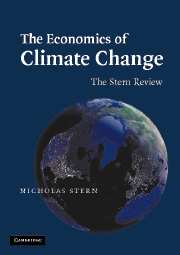Book contents
- Frontmatter
- Contents
- Preface
- Acknowledgements
- Introduction
- Summary of Conclusions
- Part I Climate Change – Our Approach
- Part II Impacts of Climate Change on Growth and Development
- Part III The Economics of Stabilisation
- Part IV Policy Responses for Mitigation
- Part V Policy Responses for Adaptation
- Part VI International Collective Action
- Abbreviations and Acronyms
- Postscript
- Technical Annex to Postscript
- Index
Part I - Climate Change – Our Approach
Published online by Cambridge University Press: 05 March 2014
- Frontmatter
- Contents
- Preface
- Acknowledgements
- Introduction
- Summary of Conclusions
- Part I Climate Change – Our Approach
- Part II Impacts of Climate Change on Growth and Development
- Part III The Economics of Stabilisation
- Part IV Policy Responses for Mitigation
- Part V Policy Responses for Adaptation
- Part VI International Collective Action
- Abbreviations and Acronyms
- Postscript
- Technical Annex to Postscript
- Index
Summary
Part I of the Review considers the nature of the scientific evidence for climate change, and the nature of the economic analysis required by the structure of the problem which follows from the science.
The first half of the Review examines the evidence on the economic impacts of climate change itself, and explores the economics of stabilising greenhouse gas concentrations in the atmosphere. The second half of the Review considers the complex policy challenges involved in managing the transition to a low-carbon economy and in ensuring that societies can adapt to the consequences of climate change that can no longer be avoided.
The Review takes an international perspective. Climate change is global in its causes and consequences, and the response requires international collective action. Working together is essential to respond to the scale of the challenge. An effective, efficient and equitable collective response to climate change will require deeper international co-operation in areas including the creation of price signals and markets for carbon, scientific research, infrastructure investment, and economic development.
Climate change presents a unique challenge for economics: it is the greatest example of market failure we have ever seen. The economic analysis must be global, deal with long time horizons, have the economics of risk and uncertainty at its core, and examine the possibility of major, non-marginal change. Analysing climate change requires ideas and techniques from most of the important areas of economics, including many recent advances.
- Type
- Chapter
- Information
- The Economics of Climate ChangeThe Stern Review, pp. 1 - 2Publisher: Cambridge University PressPrint publication year: 2007
- 2
- Cited by

